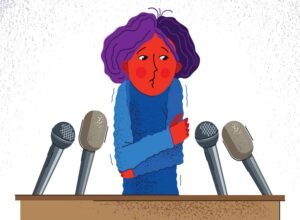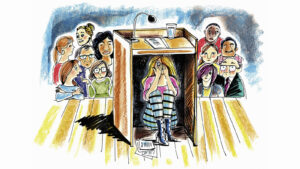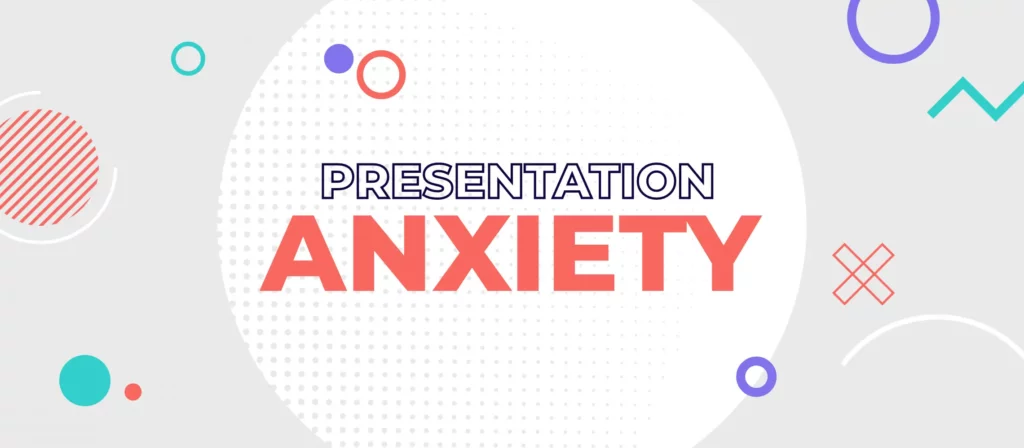We’ve all been there before. The room is dark, and the only light comes from the projector screen in front of you. You can feel everyone’s eyes on you, and your heart is racing. You take a deep breath and begin to speak, but your mind goes blank. You stumble over your words, and by the end of your presentation, you feel like a complete mess. If this sounds familiar, then you may be suffering from presentation anxiety. In this blog post, we will discuss what presentation anxiety is, how to recognize it, and how to overcome it!
Contents
Defining Presentation Anxiety
 It may be very tell-all from the description given, however presentation anxiety is the fear or nervousness one experiences when presenting in front of an audience. This can be for a small group presentation or even large keynotes! It is often the number one fear people have and for some, it trumps things like spiders, heights, and flying.
It may be very tell-all from the description given, however presentation anxiety is the fear or nervousness one experiences when presenting in front of an audience. This can be for a small group presentation or even large keynotes! It is often the number one fear people have and for some, it trumps things like spiders, heights, and flying.
The important thing to note is the difference between shyness/nervousness and anxiety. While everyone may get a bit nervous before presenting, those with presentation anxiety often experience more intense symptoms such as a racing heart, sweating, trembling, and even nausea. For some people, the fear is so intense that they may avoid presenting altogether.
It is also essential to keep in mind that presentation anxiety is not the same as stage fright. Stage fright is the fear of being on stage in front of an audience. This can be due to a bad experience in the past or a general feeling of uneasiness. While presentation anxiety is focused on the content of the presentation and how well you will do, stage fright is more about the physical act of being on stage.
Signs And Symptoms
Recognizing the signs and red flags of presentation anxiety is the first step in overcoming your fear. For some people, the symptoms may be very mild and only occur in specific situations. Others may find that their anxiety is more constant and interferes with their daily lives. The most common signs and symptoms of presentation anxiety include the following.
- Avoiding social situations or events where you know you will have to present
- Experiencing physical symptoms such as a racing heart, sweating, trembling, or nausea
- Feeling dizzy or lightheaded
- Having trouble sleeping or concentrating
- Feeling irritable or on edge
- Imagining the worst-case scenario
- Fearing that you will embarrass yourself or be judged negatively
- Having intrusive and negative thoughts
- Dry mouth or difficulty speaking
- Mind going blank during presentations
- Feeling like you are going to faint or pass out
- Experiencing anxiety or panic attacks in the days leading up to your presentation
It is important to remember that this is only an outline of some of the most common symptoms. Everyone experiences anxiety differently, so you may experience other symptoms not listed here. If you are unsure whether or not you are suffering from presentation anxiety, it is best to consult with a mental health professional.
Causes
 The causes of such a common phenomenon can be difficult to narrow down in one single article. However, some of the most common reasons people experience presentation anxiety are as follows.
The causes of such a common phenomenon can be difficult to narrow down in one single article. However, some of the most common reasons people experience presentation anxiety are as follows.
- Fear of public speaking: For many people, the thought of speaking in front of a group is enough to trigger anxiety. This can be due to a bad experience in the past or a general feeling of uneasiness.
- Perfectionism: If you are someone who strives for perfection, then the thought of making a mistake in front of an audience can be very anxiety-inducing.
- Lack of experience: If you have little to no experience presenting, then it is only natural to feel anxious about it. The more you do it, the easier it will become.
- Imposter syndrome: This is the feeling of being a fraud or not good enough for the task at hand. It is common among high-achievers and can be very debilitating.
- Fear of being judged or evaluated negatively: This is a common cause of anxiety for many people. The fear of being judged by others can be very overwhelming and often leads to avoidance behaviors.
- Lack of preparation: If you do not feel prepared for your presentation, it is only natural to feel anxious.
- Previous bad experiences: If you have had a bad experience presenting in the past, it is likely that you will feel anxious about doing it again. This is because you may be worried that you will make the same mistakes or that the outcome will be just as bad.
- Low self-esteem or lack of confidence: Lastly, if you do not feel confident in your abilities, it is likely that you will feel anxious about presenting. This is because you may be worried that you will not be able to do a good job or that you will be found out as a fraud.
It is essential to remember that everyone experiences anxiety differently. What may cause one person to feel anxious may not have the same effect on another.
Link With Other Disorders
Our psychology and emotions are not separate entities. Therefore, it should come as no surprise that presentation anxiety is often linked with other disorders. The most common ones are as follows.
- Generalized anxiety disorder: This is a disorder characterized by excessive and long-lasting anxiety that interferes with daily life. It often leads to avoidance behaviors, as well as physical symptoms such as trembling, sweating, and difficulty sleeping.
- Social anxiety disorder: Also known as social phobia, this is a disorder characterized by intense fear and anxiety in social situations. It often leads to avoidance behaviors and can be very debilitating.
- Panic disorder: This is a disorder characterized by recurrent and unexpected panic attacks. These panic attacks are often accompanied by physical symptoms such as chest pain, heart palpitations, shortness of breath, and sweating.
- Agoraphobia: This is a disorder characterized by fear and anxiety of situations where escape may be difficult or impossible. It often leads to avoidance behaviors and can be very debilitating.
- Post-traumatic stress disorder: This is a disorder characterized by intrusive and distressing memories, flashbacks, and nightmares of a traumatic event. It often leads to avoidance behaviors and can be very debilitating.
- Obsessive-compulsive disorder: This is a disorder characterized by intrusive and distressing thoughts (obsessions) and/or repetitive behaviors (compulsions). It often leads to avoidance behaviors and can be very debilitating.
As you can see, presentation anxiety is often linked with other disorders. If you are experiencing anxiety, it is important to seek professional help.
Consequences
 It is no secret that anxiety can have a negative impact on our lives. When it comes to presentation anxiety, the consequences can be as follows.
It is no secret that anxiety can have a negative impact on our lives. When it comes to presentation anxiety, the consequences can be as follows.
- Poor performance: When we are anxious, our performance often suffers. This is because we are not able to think clearly or focus on the task at hand. As a result, our presentations may be poorer quality and we may not be able to achieve our goals.
- Avoidance: As mentioned earlier, anxiety often leads to avoidance behaviors. This means that we may start to avoid situations where we have to present. This can lead to missed opportunities and a decline in our career or studies.
- Isolation: When we start to avoid social situations, we may start to feel isolated. This can lead to feelings of loneliness and depression.
- Health problems: Anxiety can also take a toll on our physical health. When we are anxious, our body goes into “fight or flight” mode. This means that our heart rate and blood pressure increase, and we may start to experience chest pain, headaches, and stomach problems.
- Mental health problems: Anxiety can also lead to mental health problems such as depression, eating disorders, and substance abuse.
If you are experiencing any of the above consequences, it is important to seek professional help. These consequences may be dire but are manageable. This is why it is important to seek professional help if you are experiencing anxiety.
Tips To Overcome
The good news is that there are a variety of treatment options available for those suffering from presentation anxiety. Some people may only need to make a few lifestyle changes, while others may require more intensive treatment. The key is to try different methods and see what works for you.
Be rehearsed
The foremost step to lessen your anxiety is to be rehearsed. This will help you be more confident and in control when presenting. You may do so by practicing your presentation in front of a mirror or videotaping yourself. This will help you catch any mistakes and give you a better idea of how you come across to others.
Practice positive self-talk
 What we say to ourselves can have a big impact on how we feel. If you are constantly telling yourself that you are going to fail, you will likely start to believe it. On the other hand, if you tell yourself that you can do it, you will be more likely to succeed. Some lines and phrases that can help are:
What we say to ourselves can have a big impact on how we feel. If you are constantly telling yourself that you are going to fail, you will likely start to believe it. On the other hand, if you tell yourself that you can do it, you will be more likely to succeed. Some lines and phrases that can help are:
· “I am prepared.”
· “I can do this.”
· “I am confident.”
· “I am not perfect and that is okay.”
Build cues
If you think you can make it to the end of your presentation without any cues, you are wrong. Cues help to ground us and remind us of what we need to say next. They can be anything from keywords written on index cards to physical prompts like rubbing your hands together. Incorporating these cues will help you feel more prepared and in control.
Ensure comfort
Anxiety is bound to make you feel odd or uncomfortable. To counter this, it is important to make sure that you are as comfortable as possible. This means wearing clothes that you feel good in, being aware of your posture, and making sure that the room temperature is not too hot or cold.
Release tension
Anxiety makes its way into our body and makes us hold onto tension. This can lead to physical discomfort and make it difficult to focus. To release this tension, you may want to try some relaxation techniques such as deep breathing, progressive muscle relaxation, or yoga. You may even want to try aromatherapy or meditation.
Know your triggers
 Anxiety can be triggered by a variety of things such as a certain person, place, or thing. It is important to be aware of what your triggers are so that you can avoid them or be prepared for them. If you know you will be presenting in front of a large group of people, for example, you may want to do some extra relaxation techniques beforehand.
Anxiety can be triggered by a variety of things such as a certain person, place, or thing. It is important to be aware of what your triggers are so that you can avoid them or be prepared for them. If you know you will be presenting in front of a large group of people, for example, you may want to do some extra relaxation techniques beforehand.
Set realistic goals
When we set unrealistic goals, we are setting ourselves up for disappointment. This can trigger our anxiety and make it harder to cope. To avoid this, it is important to set realistic goals for ourselves. This means being realistic about what we can achieve and not putting too much pressure on ourselves.
Breathe deeply
Don’t forget to monitor your breathing. When we are anxious, our breathing becomes shallow and rapid. This can lead to dizziness and lightheadedness. To avoid this, make sure to take deep belly breaths throughout your presentation. This will help to calm you down and ease your anxiety.
Normalize failure
If you still fail or are unable to meet your goal, it is important to remember that this is normal. We all make mistakes and we all have days where things don’t go as planned. What is important is that you learn from your mistakes and keep trying. Don’t let one failure define you or your presentation skills.
Visualize success
Another method that can help ease your anxiety is to visualize yourself being successful. See yourself giving a great presentation and imagine the audience applauding you. This will help increase your confidence and reduce your anxiety.
Seek professional help

At last, if your condition is too severe and is impacting your daily life, it is important to seek professional help. This doesn’t mean that you are weak or crazy. It just means that you need a little extra help to get through this tough time. There is no shame in seeking help from a therapist or counselor. They may make use of the following techniques.
- Cognitive behavioral therapy: This type of therapy helps to identify and change the negative thoughts and behaviors that are causing your anxiety.
- Exposure therapy: This therapy involves gradually exposing yourself to the things that trigger your anxiety. This can help you to learn how to cope with your triggers and eventually overcome them.
- Narrative therapy: This therapy involves telling your story and working with a therapist to find a new perspective. This can help you to see your anxiety in a new light and eventually overcome it.
- Free association: This therapy involves saying whatever comes to mind without censoring yourself. This can help to identify the root of your anxiety and eventually work through it.
- Medication: In some cases, medication may be necessary to help control your anxiety. Your doctor can prescribe you with medication that will help to ease your symptoms.
If you suffer from presentation anxiety, know that you are not alone. Millions of people around the world suffer from this condition. However, there are ways to ease your anxiety and make it more manageable. By following the tips above, you will be on your way to giving a great presentation. So don’t let your anxiety hold you back—you can do this!
Conclusion
To conclude our blog post, we can say that presentation anxiety is a common problem that many people face. However, there are ways to overcome it. By being aware of your triggers, setting realistic goals, breathing deeply, and visualizing success, you will be on your way to giving a great presentation. If your anxiety is severe, don’t hesitate to seek professional help. With the right help, you can overcome your anxiety and live a normal life.
If you or someone you know is looking for psychological help, Therapy Mantra is here for you. We are the leading providers of online therapy and counseling. Our team of highly trained and experienced therapists can provide assistance at the most affordable rates. Contact us today to learn more about our services. You may also visit our website to book an online therapy session or download our free Android or iOS app for more information.


